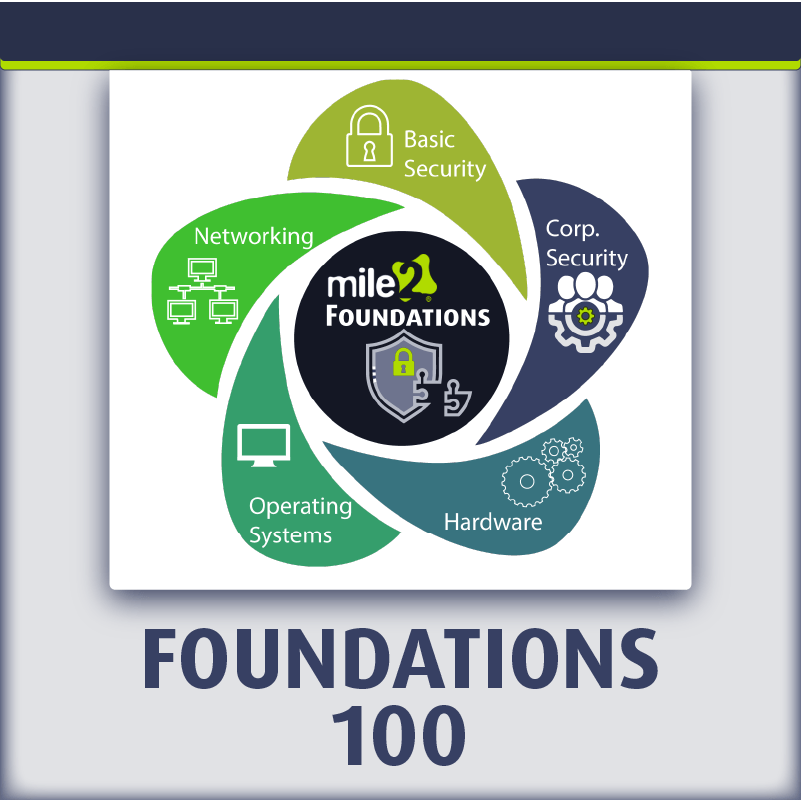Please Note:
The support ticket system is for technical questions and post-sale issues.
If you have pre-sale questions please use our chat feature or email information@mile2.com .
There are several different career options in the cybersecurity field, and each one takes a different skill set. Still, there are certain hard and soft skills that apply to the entire spectrum of cybersecurity careers.

In 1985, when I was rollerskating to Cindy Lauper in my driveway, ‘cybersecurity’ wasn’t something I had ever heard of. 10 years later, in 1995, I saw “The Net” with Sandra Bullock and was introduced, for the first time, to the powerful capabilities of digital information in our world. It left an impact, but I was (and still am) creatively minded. I was in my first year of college, and wanted to be an artist of some sort. My computer knowledge was minimal and mostly based in DOS. Heck, I had learned to type on an actual typewriter and had searched for information in a library using a card catalog.
Over the next 2 decades I would start my own business, and watch as digital technology slowly invaded every aspect of my existence. I often resisted, “Why does a phone need to have an internet connection?” Then, as often happens in evolution, I reached a critical moment where I had to either evolve, or die (career-wise). I took a C+ course, learned some HTML, and figured out cloud storage. During this time, my brick and mortar business began to falter and I made the tough decision to shut it down. But, it turned out that I had a unique set of abilities that quickly landed me a marketing position at an engineering company. 1.5 years later, an opportunity came available at Mile2 Cybersecurity Certifications, a cybersecurity training and education company.
Here, I found my happy place. I am entrenched in an organization full of brilliant minds, dedicated to fighting tomorrow’s digital wars today.
The fast growing career sector of cybersecurity has a huge skill gap. Perhaps it’s because people think of faceless humaniods wearing hoodies ensconced in their basements as “cybersecurity” types. The truth is that cybersecurity professionals work in teams across vast networks, and there is a whole lot more than just programming and hacking involved.
There are stereotypes about cybersecurity experts; hoodies, late-nights, and zero social skills. The truth is that a majority of the positions in cybersecurity require that you work with, work for, or lead others.
Soft skills are the skills we have that allow us to work constructively with other people. Some key softskills needed in cybersecurity are:
Cyber security requires a ton of communication both written and verbal. If a person conducts a penetration test, they must be able to write a report on the results of the test. If a secure application coder is going to write a program, they must be able to listen to the the needs of the people requesting the build, respond, and engage in problem solving conversations.
There is no aspect of cybersecurity that will remove you from communicating with other people whether via phone, email, or online meeting spaces.
The real trick is when you have to communicate highly-technical information to a non-technical person, which happens ALL of the time.
Managing time, people, assets, projects, ect. is important in the job. I brought a lot of management skills with me into the cybersecurity sector. And while managing others is important, managing one’s self is of paramount importance. There’s a lot of moving parts in any information security system. You must have efficient systems in place to manage those parts and the people involved with serving and maintaining them.
New problems come up in cybersecurity on a regular basis and it is important that you have those problem solving skills when they do. With the development and implementation of “Common Core” math, young people are being taught that there is more than one way to solve a problem, and that there may be more than one ‘right’ way to come to a conclusion. This is vital to cybersecurity. Hackers develop new exploits all of the time and having a flexible mind capable of taking the tools at hand to find a solution is the mark of a great cybersecurity professional.
This one probably surprised me the most. I incorrectly assumed that all cybersecurity jobs required advanced math and science degrees. The truth is that I work with some of the most creative people I have ever met. In their spare time many are musicians, writers, gardeners, and digital artists.
Plus, someone has to take these highly advanced concepts and figure out how to communicate them to less than technical minds. Marketing, graphic design, motion graphics and video artists are needed in this field.

This gets a little complicated. There are a lot of different types of jobs available in the cybersecurity arena. Some you would expect: Ethical Hackers, Coders, etc. However, some may surprise you: Teachers, Marketing, Creatives, Web Designers, Social Media experts, Human Resource Professionals, etc. Different hard skills are required in these diverse job roles:
Technical skills, of course, are one of the main pieces to a cybersecurity career. You need to be comfortable with computers, mobile devices, and the internet. Having knowledge in this field is important. But if you don’t have that knowledge, don’t worrry! There are plenty of options for acquiring this knowledge. At Mile2 we offer a collection of courses that we characterize as “Foundations”. These courses offer the foundational knowledge needed for any IT career, including cybersecurity.
This is a big one. I once heard critical thinking described as “thinking about thinking”. This is a great way to approach cybersecurity. Often times we think about a problem and come up with a solution, take a break, come back and think about the solution we came up with only to discover something we hadn’t thought of yet. With critical thinking we take our prior knowledge, new knowledge, desired outcome, and potential threats, uses, or interactions to build bridges to the future we envision.
Not all cybersecurity careers require knowledge of computing languages. The best manager I have worked with didn’t have any computing language knowledge, but he was such an effective leader that it didn’t matter. However, MOST careers in this field will require some type of computing language familiarity. Which language(s) you might need to know will depend on the job you go after.
With critical thinking we take our prior knowledge, new knowledge, desired outcome, and potential threats, uses, or interactions to build bridges to the future we envision.
These are just a few of the hard and soft skills required to be a cybersecurity professional, there are so many more. One of the biggest personal assets you can bring to this field is curiousity and a desire to learn.
Cybersecurity careers are high in demand, but also high in competition. For a cybersecurity career, a basic knowledge in security awareness, network polices, and operating systems is a great place to start. Knowledge of these topics make your career journey easier. Mile2 offers several course packs that can help you achieve the proper certifications to become a cybersecurity professional. Some of those course packs are as follows.
The certified hardware technician course (CHT) will provide you with the knowledge needed to install, configure, and support computer hardware systems. The course also provides an understanding of the basics of networking and security forensics. It also provides insight into proper customer service since customer service is a big part of a cybersecurity career. The course dives into the networks of mobile devices and customer builds for end user development.
The certified operating systems technician (C)OST builds on the C)HT by focusing on operating systems such as installing, configuring, and maintaining devices, PCs, and software. It will also teach you how to Properly and safely diagnose, resolve, and document common software issues. This is where you will apply troubleshooting and problem-solving skills. The COST also covers virtualization, security, desktop imaging, and deployment.
The Security Awareness 2 course C)SA2 helps students take cyber awareness to the next level. You will understand the security threats that are associated with company culture. The course also dives into how to respond to certain cyber-attacks including the legal requirements for doing so. The course will teach early detection and prevention practices as well as who to report suspected intrusions to.
The certified network principles course C)NP will provide a solid education about networks and their principles. In this course, you will learn concepts and skills needed to plan, install, maintain, and troubleshoot today’s networks as well as wireless server networks. The course covers new technologies like virtual networks and SD networks. The course also covers physical components, switches, routers, wireless, and Bluetooth.

Mile2's Foundation 100 Course pack includes all 5 of the certifications listed above and come in payment options for as little as $85/mo.
The key to any successful journey is a good map. If you are interesed in the different Job Roles available in the cybersecurity sector, Mile2’s Cybersecurity Certifications Roadmap is a great resource.
The support ticket system is for technical questions and post-sale issues.
If you have pre-sale questions please use our chat feature or email information@mile2.com .

This website uses cookies so that we can provide you with the best user experience possible. Cookie information is stored in your browser and performs functions such as recognising you when you return to our website and helping our team to understand which sections of the website you find most interesting and useful.
Strictly Necessary Cookie should be enabled at all times so that we can save your preferences for cookie settings.
If you disable this cookie, we will not be able to save your preferences. This means that every time you visit this website you will need to enable or disable cookies again.